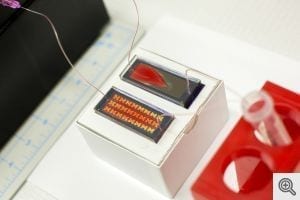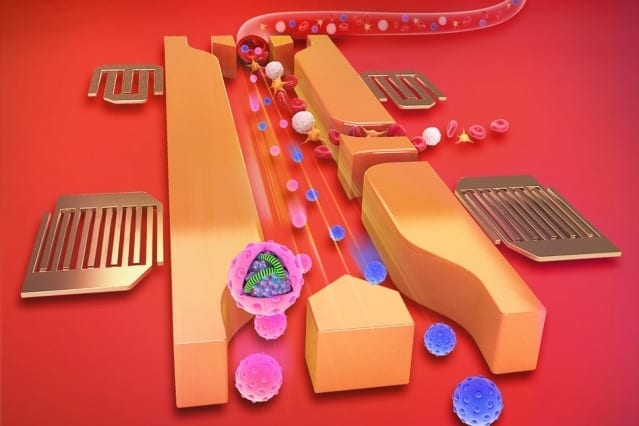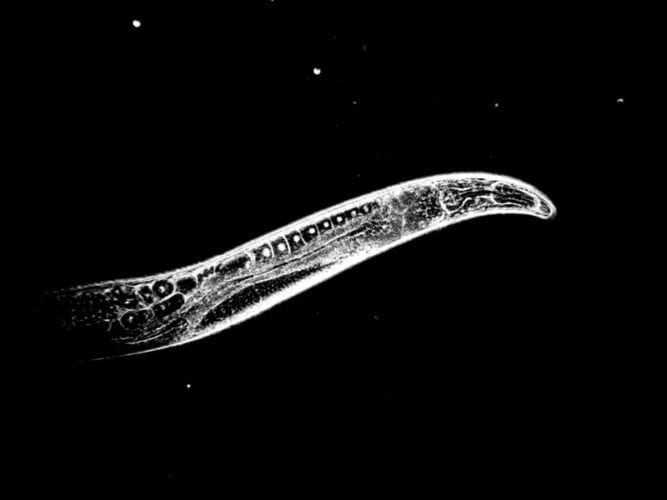
A microfluidic chip developed at the University of Michigan is among the best at capturing elusive circulating tumor cells from blood—and it can support the cells’ growth for further analysis.
The device, believed to be the first to pair these functions, uses the advanced electronics material graphene oxide. In clinics, such a device could one day help doctors diagnose cancers, give more accurate prognoses and test treatment options on cultured cells without subjecting patients to traditional biopsies.
“If we can get these technologies to work, it will advance new cancer drugs and revolutionize the treatment of cancer patients,” said Max Wicha, M.D., Distinguished Professor of Oncology and director of the U-M Comprehensive Cancer Center and co-author of a paper on the new device, published online this week in Nature Nanotechnology.
“Circulating tumor cells will play a significant role in the early diagnosis of cancer and to help us understand if treatments are working in our cancer patients by serving as a ‘liquid’ biopsy to assess treatment responses in real time,” said co-author Dr. Diane Simeone, the Lazar J. Greenfield Professor of Surgery at the U-M Medical School and director of the Translational Oncology Program.
“Studies of circulating tumor cells will also help us understand the basic biologic mechanisms by which cancer cells metastasize or spread to distant organs—the major cause of death in cancer patients.”
Yet these cells aren’t living up to their promise in medicine because they are so difficult to separate from a blood sample, the researchers say. In the blood of early-stage cancer patients, they account for less than one in every billion cells, so catching them is tougher than finding the proverbial needle in a haystack.
“I can burn the haystack or use a huge magnet,” said Sunitha Nagrath, an assistant professor of chemical engineering, who led the research. “When it comes to circulating tumor cells, they almost look like—feel like—any other blood cell.”
On their microfluidic chip, Nagrath’s team grew dense forests of molecular chains, each equipped with an antibody to grab onto cancer cells.
Even after the cells are caught, it’s still hard to run a robust analysis on just a handful of them, the researchers say. That’s why this demonstration of highly sensitive tumor cell capture, combined with the ability to grow the cells in the same device, is so promising.
Hyeun Joong Yoon, a postdoctoral researcher in the Nagrath lab with a background in electrical engineering, was instrumental in making the microfluidic chip. He started with a silicon base and added a grid of nearly 60,000 flat gold shapes, like four-petaled flowers, each no wider than a strand of hair.
The gold flowers naturally attracted a relatively new material called graphene oxide. These sheets of carbon and oxygen, just a few atoms thick, layered themselves over the gold. This layered formation allowed the team to grow the tumor-cell-catching molecular chains so densely.
“It’s almost like each graphene has many nano-arms to capture cells,” Nagrath said.
To test the device, the team ran one-milliliter samples of blood through the chip’s thin chamber. Even when they had added just three-to-five cancer cells to the 5-10 billion blood cells, the chip was able to capture all of the cells in the sample half the time, with an average of 73 percent over 10 trials.
“That’s the highest anybody has shown in the literature for spiking such a low number of cells,” Nagrath said.
The Latest Bing News on:
Liquid biopsy
- APCCC 2024: When to Do Tumor Genomic Profiling in Advanced Prostate Cancer and What?on April 26, 2024 at 3:55 pm
Advanced Prostate Cancer Consensus Conference (APCCC) meeting featured a session on the management of metastatic CRPC (mCRPC), and a presentation by Dr. Niven Mehra discussing when we should do tumor ...
- Sophia Genetics Announces Syndicate Bio As First Liquid Biopsy Customer In Africaon April 26, 2024 at 1:03 am
Boston, MA and Rolle, Switzerland, April 23, 2024 ndash; SOPHiA GENETICS (Nasdaq: SOPH), a cloud-native software company in the healthcare space and a leader i ...
- FTSE 100 Live 24 April: No record close as index finishes down four points, Lloyds up despite profit slideon April 24, 2024 at 11:06 pm
The rejuvenated FTSE 100 index touched a new record today in a session when the focus turned to UK banking stocks.Lloyds Banking Group kicked off the sector’s reporting season by posting a 28% fall in ...
- Key Takeaways From Guardant Health Analyst Ratingson April 24, 2024 at 1:01 pm
The 12-month price targets, analyzed by analysts, offer insights with an average target of $35.71, a high estimate of $45.00, and a low estimate of $28.00. Observing a downward trend, the current ...
- Mercy BioAnalytics to Present Results from a Large Ovarian Cancer Screening Study at the ASCO Annual Meetingon April 24, 2024 at 8:00 am
Mercy BioAnalytics, Inc., a pioneer in extracellular vesicle-based liquid biopsy for the early detection of cancer, will present data at the 2024 American Society of Clinical Oncology (ASCO) Annual ...
- Company developing early cancer-detection tests to cut 20% of workforceon April 24, 2024 at 7:35 am
Early cancer-detection test maker that raised $254 million earlier this year now says it will cut more than 100 jobs — about 20% of its workforce — as it restructures ...
- Angle inks deal with AstraZenecaon April 24, 2024 at 7:08 am
Liquid biopsy specialist Angle announced a supplier agreement with AstraZeneca on Wednesday to develop and validate a methodology using Angle's existing DNA damage response (DDR) assay for the ...
- Liquid biopsy firm Angle signs new commercial agreement with AstraZenecaon April 24, 2024 at 12:16 am
United Kingdom-based liquid biopsy company Angle (OTCQX:ANPCY) has signed a supplier agreement with the biopharmaceutical company AstraZeneca (NASDAQ:AZN) to tailor the existing Parsortix-based DNA ...
- Non-Invasive Liquid Biopsy Market CAGR of 15.7%, Size, Trends, Growth Status, Share, Research, and Forecast 2024 to 2032on April 16, 2024 at 2:06 pm
Liquid biopsy has emerged as a promising non-invasive technique for detecting and monitoring various types of cancers. Unlike traditional tissue biopsies, which often involve invasive procedures, ...
- Liquid Biopsy Whole-Genome Sequencing Optimizes MRD Detection in DLBCLon April 13, 2024 at 5:00 am
Using the newly created MAESTRO-Pool tool, whole genome sequencing revealed DNA that could be used to more effectively detect minimum residual disease (MRD) in patients who have diffuse large B-cell ...
The Latest Google Headlines on:
Liquid biopsy
[google_news title=”” keyword=”Liquid biopsy” num_posts=”10″ blurb_length=”0″ show_thumb=”left”]
The Latest Bing News on:
Diagnosing cancers
- Harry Jowsey reveals skin cancer diagnosis at age 26 — here’s what to know about the ‘scary’ diseaseon April 27, 2024 at 12:38 pm
Harry Jowsey has been diagnosed with skin cancer at the age of 26. The former “Dancing With The Stars” contestant revealed the shock health news in a TikTok video Friday evening, urging his followers ...
- Too Hot to Handle star Harry Jowsey reveals skin cancer diagnosison April 27, 2024 at 9:09 am
Harry Jowsey, a former contestant on the Netflix series Too Hot to Handle, has revealed his skin cancer diagnosis while urging fans to wear sunscreen. The Australian TV personality first appeared on ...
- Harry Jowsey urges followers to wear sunscreen after skin cancer diagnosison April 27, 2024 at 7:05 am
TV personality Harry Jowsey has urged people to "please wear sunscreen" after being diagnosed with skin cancer. The 26-year-old, who previously appeared on ABC's Dancing With The Stars and Netflix's ...
- King Charles to resume royal duties after cancer diagnosison April 27, 2024 at 4:49 am
King Charles III is set to resume royal duties following his cancer diagnosis.
- King Charles to resume public royal duties after cancer diagnosison April 26, 2024 at 4:49 pm
Charles and his wife, Queen Camilla, will make a joint visit Tuesday to a cancer treatment center, marking his first public engagement in weeks. Several other events are scheduled, palace officials ...
- A timeline of King Charles' health struggles, from his cancer diagnosis to his return to public dutieson April 26, 2024 at 2:05 pm
Months after King Charles III was diagnosed with cancer, he is set to return to public-facing duties to visit a cancer treatment center.
- OCDE Superintendent Al Mijares announces retirement amid cancer diagnosison April 26, 2024 at 1:49 pm
After 12 years of serving as the Orange County Department of Education’s superintendent, Al Mijares will retire at the end of June. Mijares announced his retirement on Friday, April 26, citing medical ...
- King Charles Resuming Public Duties ‘Shortly,’ After Cancer Diagnosison April 26, 2024 at 10:46 am
King Charles announced his cancer diagnosis in February after receiving treatment for a benign prostate enlargement.
- King Charles III Returning to Public Duties After Cancer Diagnosison April 26, 2024 at 10:44 am
Nearly three months after King Charles III's cancer diagnosis, Buckingham Palace announced when the 75-year-old will return to public-facing duties.
- King Charles returning to royal duties following cancer diagnosison April 26, 2024 at 10:28 am
King Charles is officially resuming royal engagements following his cancer diagnosis in January. Next week, he and Queen Camilla plan to visit a cancer treatment center.
The Latest Google Headlines on:
Diagnosing cancers
[google_news title=”” keyword=”diagnosing cancers” num_posts=”10″ blurb_length=”0″ show_thumb=”left”]










